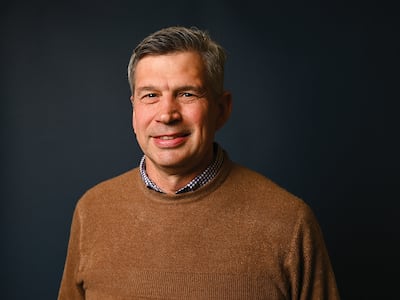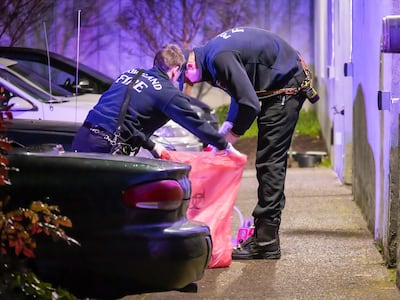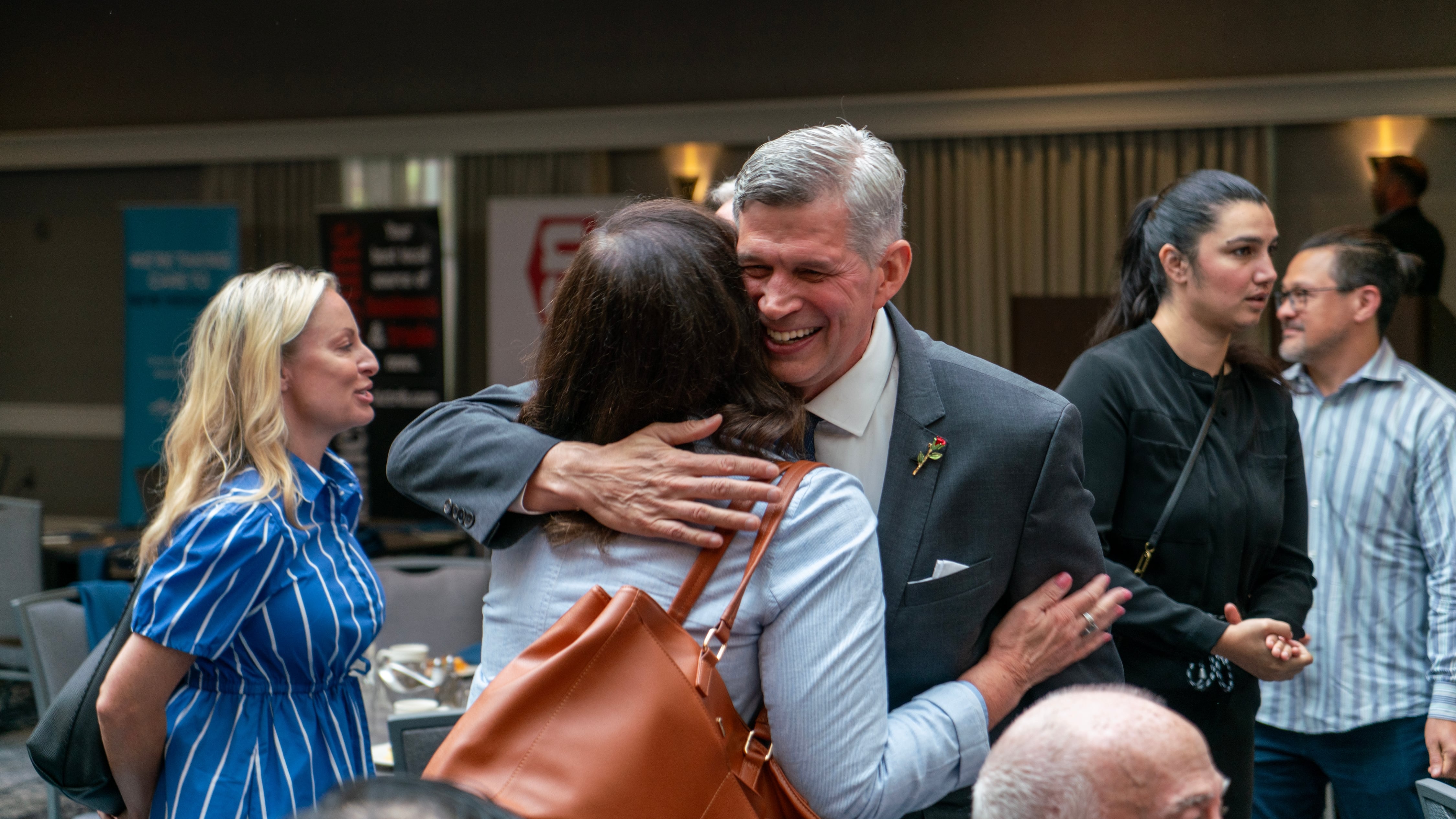Rene Gonzalez’s campaign message runs clear as Bull Run water: He wants to make Portland “the safest city in America.” And he’s got a plan for doing that.
“I’ll get us to a thousand police officers, bring back neighborhood watches and bring back business watches,” Gonzales says in an interview at his campaign office on the North Park Blocks. (The Portland Police Bureau currently employs 801 sworn officers.)
To illustrate his point, Gonzalez says that right outside, police have been trying to clear drug dealers from turf where preschoolers sometimes play. The dealers “just keep coming back,” he says.
Gonzalez is in pretty good shape for a desk jockey, but his face reddens when he talks about the city he’s seeking to lead.
“In this town, it’s become a cottage industry to attack the Portland police,” says Gonzalez, an Eastmoreland resident who grew up in Alaska, the son of a prosecutor.
“I will confront that world directly every single day, and that carries over to the U.S. Department of Justice and an out-of-control federal judge,” he continues, referring to U.S. District Judge Michael Simon, who is overseeing a federal legal settlement with the Police Bureau. “I will be unapologetic in confronting both of those forces.”
Critics say Gonzalez, 50, is a grandstander who lacks substance. “All Rene has is anger and soundbites and no accomplishments,” says state Rep. Rob Nosse (D-Southeast Portland), who supports Carmen Rubio. “What has he actually done except take credit for other people’s work?”
But Gonzalez and his supporters are betting on what President Richard Nixon once labeled the “silent majority,” people who hold strong views but don’t express them publicly.
“Candidates like Rubio are speaking to an alternate reality,” says Jessie Burke, an Old Town hotelier and Gonzalez supporter. “Rene’s talking about what I and the average person are seeing on the streets.”
In a city that prizes nonconformity and where protesting is a competitive sport, Gonzalez, a rumpled former business lawyer, might seem like he’s running against the grain. But extensive polling by the Oregon Values and Beliefs Center suggests his message could resonate with a city suffering from compassion fatigue.
“The biggest three changes Portlanders have seen in the last three years,” the polling found, “are an increase in three things: homelessness, drug use and crime.”
Gonzalez talks about little else. The question for voters is whether he can fix those problems. A look at his brief tenure—he entered the mayor’s race less than a year after winning election as city commissioner—and his largest assignment at City Hall, overseeing Portland Fire & Rescue, offer clues about whether Gonzalez is ready.

Gonzalez came to politics as an activist—he led a group of parents who pushed for faster reopening of public schools during the pandemic.
A former soccer player at Willamette University who as a volunteer built the city’s largest youth soccer club, Gonzalez still hits the futsol pitch once a week. A father of three, he started a small legal and technology firm with his wife, Angie Uggen, before entering politics.
Since he first won election in 2022, defeating Commissioner Jo Ann Hardesty, Gonzalez’s policy achievements are modest. His ordinance to criminalize graffiti, introduced Sept. 13, is among the few policies he’s proposed since joining the council last year.
But he has built a close alliance with employees at the two bureaus he oversaw, the Bureau of Emergency Communications and Portland Fire & Rescue.
He’s comfortable in that world. The largest photo on the endorsement page of Gonzalez’s campaign website shows him surrounded by 11 members of the Portland Fire Fighters’ Association.
Lt. Isaac McLennan, president of the firefighters’ union, says the rank and file loves Gonzalez. “He made a point to visit every station and hear what their issues were,” McLennan says. “To the firefighters, that meant a lot.”
He’s gone to bat for firefighters in ways big—constantly pushing for more resources for Portland Fire & Rescue—and small.
One example of the latter: In 2022, the City Auditor’s Office dinged a firefighter for washing his personal vehicle on duty after somebody filed a complaint. The auditor noted that the conduct violated a city rule that “prohibits personal use of city resources, and water at a city facility is a city resource.”
When firefighters asked to include the right to wash their vehicles on city time twice a month in the city contract negotiated last year, Gonzalez enthusiastically supported the addition.
“It’s a $20,000 investment in something that they appreciate,” Gonzalez says. “It is chump change.”
More significant is the overtime paid to firefighters. It has risen from $6.8 million in 2010-11, when the City Auditor’s Office was concerned enough to devote an entire report to it, to $24.6 million last year. (For comparison, the Portland Police Bureau, which has a budget more than 50% larger than fire, spends less on overtime.)
The firefighters’ contract is replete with specialty pay bumps. For instance, Portland is unique among big city fire departments in that it pays every sworn member a 3% bonus for being qualified to drive fire vehicles.
After the Police Bureau, the fire bureau has the second-largest general fund budget ($194 million for 2024-25) and, for years, the city budget office has highlighted the bureau’s inability to live within its means. A budget review released earlier this year showed that the bureau has overspent its budget in each of the past five years, driven by overtime.
Only two of those years came on Gonzalez’s watch. He inherited a problem. But he also didn’t fix it.
In the 2023-24 fiscal year, Gonzalez’s first full year overseeing the bureau, overtime surged again, finishing about $6 million over budget, double the amount the bureau spent on overtime five years ago.

He and Fire Chief Ryan Gillespie say that the challenges are structural—that the bureau struggles to meet minimum staffing standards and so calls back firefighters on overtime to make up the shortage.
Outside consultants faulted the bureau for taking far longer to train new firefighters than peer agencies and for refusing to hire laterally. (Gillespie and Gonzalez say the bureau has recently shortened its training time and begun hiring laterally.)
Gonzalez says the bureau has also added 13 new positions, but because of the time it takes to train firefighters, the budget impact will be slow.
McLennan, the union leader, pushes back on the premise that the soaring overtime spending is a benefit for his members. “Overworking our people is burning them out,” he says. “It’s not safe and it’s not good for families. That may not be popular with firefighters, but it’s true.”
But one effect of the skyrocketing overtime is that the three highest-paid city employees last year all worked for the fire bureau (the salary average of the three: $340,000) with one of them making $185,000 in overtime alone.
Gonzalez points to data saying the overtime increase flattened in the latter part of the last fiscal year and is trending down this fiscal year (which also coincides with a civilian administrator taking control of the bureau for the first time).
Robert McCullough, an economist and longtime member of a city budget advisory committee, agrees with Gonzalez on police staffing and many other issues. He’s pored over the fire bureau budget and recent consultants’ reports.
He says that rather than being a change agent, Gonzalez appears to have been captured by the Portland Fire Fighters’ Association, whose endorsement helped him defeat Hardesty and whose members benefit financially from an expansion in overtime.
“The question is how did Rene lose his focus on and interest in efficiency so quickly?” McCullough says. “That’s an amazing example of the culture capturing a person.”
Gonzalez’s track record with firefighter overtime raises two questions: whether he could be a mayor for all of Portland, not just the people who agree with him, and whether he could instill a culture of fiscal discipline in the new form of city government.
Gonzalez denies he’s in thrall to the fire bureau. He says after 20 years as a transactional lawyer, he’s adept at compromise and finding solutions that work for everybody, not just his client. He also says he’s disagreed with both the police and fire unions on their push for health insurance benefits that would put the city at a disadvantage. And on fire union grievances, he’s always sided with management. “I’ve never once intervened for the union on those,” he says.
Gonzalez is proud of his endorsement by the Portland Police Association as well his support from firefighters. But with some key public employee unions, he is persona non grata—by choice.
He didn’t seek endorsements from Service Employees International Union, the state’s largest labor group, or the American Federation of State, County and Municipal Employees, which represents more than 1,000 civilian city employees.
He believes SEIU put a target on him in 2022. “They declared war on me the moment I became a prominent challenger to Jo Ann,” he says. “I stand for everything they want to rip apart in this town.”
Records show Jay Parasco, who works for SEIU Local 503, filed an elections complaint alleging Gonzalez’s campaign improperly benefited from a subsidized campaign office. The complaint tied up Gonzalez’s public funding in the Hardesty race. Parasco says he has no involvement in the union’s Portland issues and filed the complaint as a private citizen.
Felisa Hagins, SEIU’s Portland leader, says she was previously unaware of the complaint, but adds she is “disappointed” in Gonzalez’s refusal to engage with her union this election cycle. “We have a long-standing tradition of working with everybody who shares our values, whether or not we endorse them,” Hagins says.
Other progressive groups, such as Home PAC, established by nonprofit affordable housing leaders this year, also say Gonzalez didn’t seek the 10-question survey for their endorsement. “We really thought and we hoped he would fill it out,” says Diane Linn, who organized the survey. “A lion’s share of candidates did.”
If Gonzalez gets elected, he’s going to have to deal with labor—nearly the entire city workforce is now unionized—and with the progressive groups that hold sway at City Hall.
But he did just fine in 2022 without many establishment endorsements or Hardesty’s base on the left. Gonzalez thinks his formula—focusing on the silent majority’s concerns about the city’s livability—will work again.
Even one of his toughest critics worries he may be right. Nosse, who represents and lives in an uber-liberal stretch of inner Southeast, says the people in his neighborhood are as mad as Gonzalez.
“Sadly, for me, a bunch of my neighbors are angry about the condition of the city,” Nosse says. “They are progressive as hell, but they’re interested in Rene’s rhetoric.”

